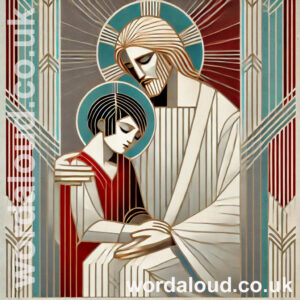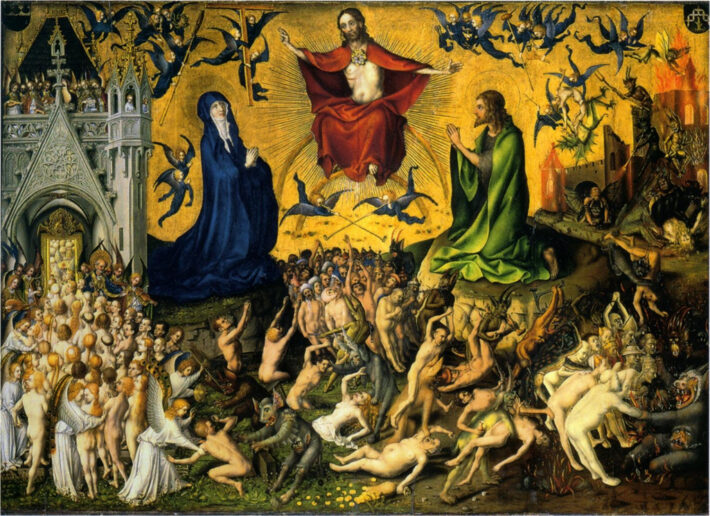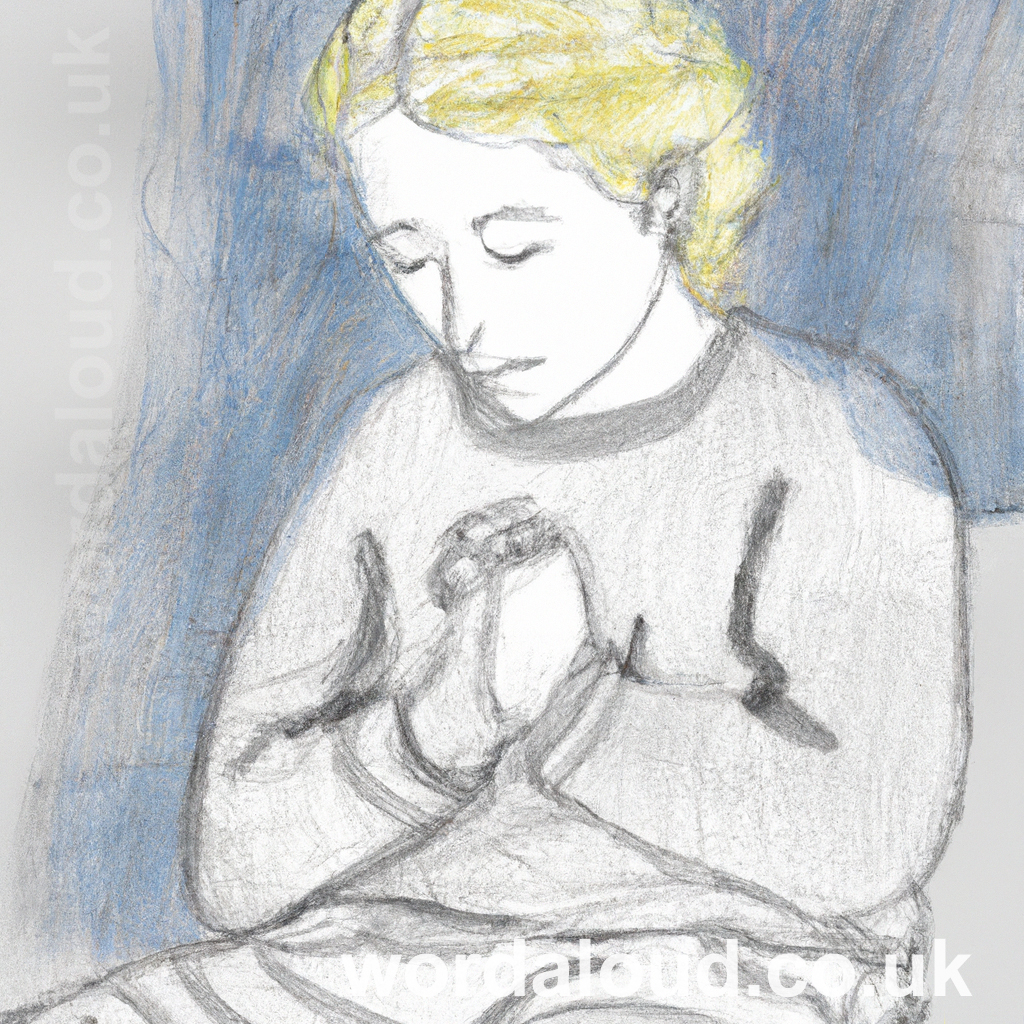Christian Art | Jesus | Throne Of Glory | Sheep And Goats
Matthew 25: 31-46 – Lent Week 1, Monday (Audio Bible, Spoken Word)
31 ¶ When the Son of man shall come in his glory, and all the holy angels with him, then shall he sit upon the throne of his glory:
32 And before him shall be gathered all nations: and he shall separate them one from another, as a shepherd divideth his sheep from the goats:
33 And he shall set the sheep on his right hand, but the goats on the left.
34 Then shall the King say unto them on his right hand, Come, ye blessed of my Father, inherit the kingdom prepared for you from the foundation of the world:
35 For I was an hungred, and ye gave me meat: I was thirsty, and ye gave me drink: I was a stranger, and ye took me in:
36 Naked, and ye clothed me: I was sick, and ye visited me: I was in prison, and ye came unto me.
37 Then shall the righteous answer him, saying, Lord, when saw we thee an hungred, and fed thee? or thirsty, and gave thee drink?
38 When saw we thee a stranger, and took thee in? or naked, and clothed thee?
39 Or when saw we thee sick, or in prison, and came unto thee?
40 And the King shall answer and say unto them, Verily I say unto you, Inasmuch as ye have done it unto one of the least of these my brethren, ye have done it unto me.
41 Then shall he say also unto them on the left hand, Depart from me, ye cursed, into everlasting fire, prepared for the devil and his angels:
42 For I was an hungred, and ye gave me no meat: I was thirsty, and ye gave me no drink:
43 I was a stranger, and ye took me not in: naked, and ye clothed me not: sick, and in prison, and ye visited me not.
44 Then shall they also answer him, saying, Lord, when saw we thee an hungred, or athirst, or a stranger, or naked, or sick, or in prison, and did not minister unto thee?
45 Then shall he answer them, saying, Verily I say unto you, Inasmuch as ye did it not to one of the least of these, ye did it not to me.
46 And these shall go away into everlasting punishment: but the righteous into life eternal.
The parables which comprise the eschatological discourse – following the Sermon in the Temple and, on the Mount of Olives, to Christ’s disciples privately – are completed with Christ’s announcement of a rigorous last judgement. The structure of time will be complete. Those who have been true to Christ and his teaching will be admitted to glory. Those who have failed, who have remained in sin, will be forever excluded. There will be justice. Just as we will have implicitly judged ourselves, so Christ will judge.
The criteria for judgement are at once both simple and demanding. We are called to see Christ in our fellow man. We are called to love our neighbour as ourselves, just as we are called to love Christ. We are called to see every human being, especially those who are most marginalized and dispossessed, as our neighbour. And, as St Paul will say, without love our good works are as nothing; we could cling to the letter of the law and nonetheless find that, without love, our labours have been in vain.
Jesus tells us that those who have most loved him may themselves not know the good that they have done for him. He describes their amazement at being judged as righteous for the good they have done. And so he explains: the good that you have done for other people is the good done for me. We are a brotherhood in Christ.
Christ began the Sermon on the Mount with the eight Beatitudes. The blessed are the poor in spirit, those that mourn, who are meek, who hunger and thirst after righteousness, who are merciful, who are pure in heart, who make peace and who are persecuted for righteousness’ sake. We are presented by Christ, toward the start of his ministry, with this idea of the gateway to heaven, expressed in terms of who we are. Now, as we draw near to the Passion, we are told what to do.
We have confessed our sins. We continue to confess them. Through the course of Lent especially we seek to recognise every moment our flawed humanity and our longing to be made perfect in the glory of Christ. We focus upon listening intently to our calling, to our vocation to be with Jesus.
We are, in part, called to intense self-reflection, to see Christ’s light shining around inside ourselves and so disclosing the shadows within us, then to give these evils up and be reconciled with our God. This is our penance.
Love, meanwhile, propagates love. Christ identifies himself in this Bible passage with those people who are most in need, and most desperately in need, of love. Take up your cross and follow me: love may at times not be easy; to see Christ in each one of our fellow human beings may not be easy; it may seem a cross to bear.
The words of St Paul (1 Corinthians 13):
4 Charity suffereth long, and is kind; charity envieth not; charity vaunteth not itself, is not puffed up,
5 Doth not behave itself unseemly, seeketh not her own, is not easily provoked, thinketh no evil;
6 Rejoiceth not in iniquity, but rejoiceth in the truth;
7 Beareth all things, believeth all things, hopeth all things, endureth all things.
May we seek especially through this Lenten time to be true to this teaching.
‘Let us imitate the first and most important law of God who sends his rain on the just and on sinners and makes the sun shine on all men equally. God opens up the earth, the springs, the streams and the woods to all who live in the world. He gives the air to the birds, the water to the fish, and the basic needs of life abundantly to all, without restriction or limitation or preference. These basic goods are common to all, provided by God generously and with nothing lacking.’ St Gregory Nazianzen
![]()

Audio Bible KJV | Endnotes
Death, Judgement, Heaven, Hell | Last Things
Jesus’ teaching on the final judgment separates the righteous from the unrighteous. The righteous are rewarded with eternal life in heaven, while the unrighteous are punished with eternal separation from God in hell.
Hell is not a punishment arbitrarily inflicted by God, but a consequence of a person’s choices and actions. God offers salvation through faith in Jesus Christ, and those who reject this offer will face the consequences of their decision.
Hell is not a place where God delights in punishing people. It is a place of justice where those who have rejected God and His ways will face the consequences of their actions. God desires that all people would repent and turn to Him, and it is out of love that He warns us of the consequences of rejecting Him.
Pope Francis has spoken about the reality of judgment, heaven, and hell in his teachings and homilies.
In a homily in 2016 he said: ‘The Lord always forgives, but he also asks us to forgive others. He who does not forgive, in a sense, closes the door to God’s forgiveness. We need to think about this seriously. Hell is the distance that grows between us and God when we do not forgive, which slowly leads to self-absorption and despair.’
In 2018, Pope Francis spoke about the importance of living a life that is focused on serving others, saying: ‘In the end, we will be judged on love. This is the key. The love that we have shown to others will be the measure that the Lord will use to judge us.’
In his book The Name Of God Is Mercy, he wrote: ‘Mercy is not an abstract idea, but a concrete reality through which God reveals his love as that of a father or a mother, moved to the very depths out of love for their child.’








